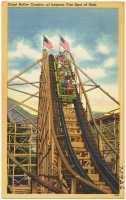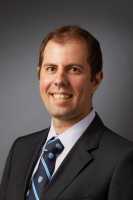
11 Nov Should Patients with Hypertrophic Cardiomyopathy Ride Roller Coasters?
MedicalResearch.com Interview with:

Dr. Papoutsidakis
Nikolaos Papoutsidakis, M.D., Ph.D.
Associate Research Scientist,
Yale University School of Medicine
New Haven, CT
MedicalResearch.com: What is the background for this study? What are the main findings?
Response: Lifestyle education is a significant part of Hypertrophic Cardiomyopathy management. HCM patients, who frequently have to abstain from intense athletics, often ask if such restrictions extend to thrill-seeking activities they previously enjoyed, such as rollercoaster rides. Werealized there is very little data on this topic, which prompted us to set up this study.
We found that for Hypertrophic Cardiomyopathy patients who elected to participate in thrill-seeking activities, adverse events (defined as losing consciousness or experiencing a shock from an implantable cardioverter-defibrillator) were rare. We also asked patients (participating and non participating) about advice received from their physician on this topic. We found that, probably due to the lack of data, physicians often avoid providing advice or provide conflicting advice regarding participation in thrill seeking activities.
MedicalResearch.com: What should readers take away from your report?
Response: On the basis of this data, participation in thrill seeking activities for Hypertrophic Cardiomyopathy patients may be more safe than previously thought. Shared decision making discussions between patients and care providers regarding the risk and benefits of participating in thrill seeking activities are preferable to universal restrictions.
MedicalResearch.com: What recommendations do you have for future research as a result of this work?
Response: Our study collected data through an online survey, meaning that unknown factors could, in theory, have biased results. We hope it is followed up by a prospective safety trial, that will conclusively report on the safety of thrill seeking activities for Hypertrophic Cardiomyopathy patients.
Disclosures: This research was made possible by the Gibson Memorial Fund for Research in Cardiomyopathies. This fund memorializes Joshua Gibson, a young physician who went to medical school at Yale with Dr. Jacoby and who died tragically of sudden death at a young age. The fund was established by a generous donation from Dr. Michael Singer who was also a classmate of Josh’s.
Citation:
AHA abstract: November 11 2018
Participation in Thrill-Seeking Activities for Hypertrophic Cardiomyopathy Patients
Nikolaos Papoutsidakis, Yale Sch of Med, New Haven, CT; Lisa Salberg, Hypertrophic Cardiomyopathy Association, Hibernia, NJ; Jodie Ingles, Christopher Semsarian, Sydney Medical Sch, Univ of Sydney, Newtown, Australia; Meghan Mannello, Oregon Health & Science Univ, Knight Cardiovascular Inst, Portland, OR; Iacopo Olivotto, Careggi Univ Hosp, Florence, Italy, Firenze FI, Italy; Niccolo Maurizi, Careggi Univ Hosp, Florence, Italy, Firenze FI,, Italy; Cynthia Waldman, HCMBeat, *, CT; Stephen Heitner, Oregon Health & Science Univ, Portland, OR; Daniel Jacoby, Yale Sch of Med, New Haven, CT
[wysija_form id=”3″]
[last-modified]
The information on MedicalResearch.com is provided for educational purposes only, and is in no way intended to diagnose, cure, or treat any medical or other condition. Always seek the advice of your physician or other qualified health and ask your doctor any questions you may have regarding a medical condition. In addition to all other limitations and disclaimers in this agreement, service provider and its third party providers disclaim any liability or loss in connection with the content provided on this website.
Last Updated on November 11, 2018 by Marie Benz MD FAAD
